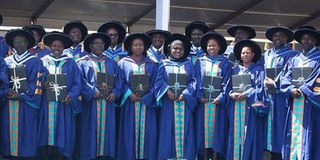PhD without a master’s degree is possible

Scholars from Kenyatta University graduate with doctoral degrees on December 20, 2019. We need to review our definition of a doctorate and what purpose it serves. PHOTO | DENNIS ONSONGO | NATION MEDIA GROUP
What you need to know:
- It is important to conduct a survey of the labour-market outcome of doctoral degree holders. This will crystallise the position of universities as the key employer of PhDs.
- While it is very difficult to ‘decolonise’ our doctoral studies curriculum, universities should not shy away from adopting a hybrid system.
Doctoral degree holders account for only a small proportion of Kenya’s population, but they play a significant role in our economy and society.
This is the only section of the population that spent so much time in the education system and can, therefore, be described as the bedrock of knowledge; the unbroken source of research ideas and a conduit for transmission of knowledge to future generations.
Every year, hundreds of PhDs join the “Kenyan intelligentsia” with capabilities of satisfying needs of the local industry.
Broadly, there are two ways that they are added to the economy. The primary one is training doctoral graduates in Kenyan institutions. This is what our universities are doing.
However, we need to review our definition of a doctorate and what purpose it serves.
If, for instance, the purpose of a PhD is to train people for academia, do we have enough? And if it is to train people to do advanced research, how far from achieving our target are we as a country?
EFFECT ON ECONOMY
If the academia elites asked themselves these hard questions, it would not be difficult for universities to be free and tell their own stories.
The secondary way of introducing PhDs into the economy is by training doctoral students in foreign institutions and then welcome them back home.
This crop of doctoral degree holders are likely to have trained from the research-intensive universities around the world and, hence, hold what may be referred to as ‘industrial doctorate degrees’.
To my knowledge, the recent census did not give any hint on figures of doctorate holders in Kenya, where they were trained and the proportion of foreign-born PhDs who immigrated into the country.
It is important to conduct a survey of the labour-market outcome of doctoral degree holders. This will crystallise the position of universities as the key employer of PhDs.
Then we are left with the question, what is the percentage uptake of doctoral degree holders in private sectors?
FLEXIBLE SYSTEM
Universities in Kenya should, by all means, come up with new strategies to fast-track attainment of doctorate degrees.
While it is very difficult to ‘decolonise’ our doctoral studies curriculum, universities should not shy away from adopting a hybrid system.
As a country, we should, by now, be able to answer the question of whether a person with a bachelor’s degree can register for doctoral studies without necessarily having a master’s degree.
Top universities, even in Africa, have already set up an effective, fair and flexible system, whereby a student registered for a master’s degree, under special circumstances, can upgrade to the doctoral programme.
The new doctoral proposal becomes an expansion of the original master’s project and meets all requirements for the doctorate.
Such systems acknowledge the achievement of hard-working postgraduate students.
Therefore, this calls for efforts towards achieving a single all-inclusive higher education system that builds bridges between academia and industry.
Dr Manyali, a PhD holder, is Dean, School of Science, Kaimosi Friends University College. [email protected].





